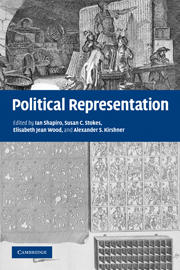Book contents
- Frontmatter
- Contents
- List of figures
- List of tables
- List of contributors
- Preface
- Editors' introduction
- Part I Representation before representative democracy
- Part II Theories of political representation
- 3 Varieties of public representation
- 4 Representative government and popular sovereignty
- 5 Making interest: on representation and democratic legitimacy
- Part III Representation and inherited injustice
- Part IV What role for representative quotas?
- Part V Preferences, persuasion, and democratic representation
- Index
- References
3 - Varieties of public representation
Published online by Cambridge University Press: 05 June 2012
- Frontmatter
- Contents
- List of figures
- List of tables
- List of contributors
- Preface
- Editors' introduction
- Part I Representation before representative democracy
- Part II Theories of political representation
- 3 Varieties of public representation
- 4 Representative government and popular sovereignty
- 5 Making interest: on representation and democratic legitimacy
- Part III Representation and inherited injustice
- Part IV What role for representative quotas?
- Part V Preferences, persuasion, and democratic representation
- Index
- References
Summary
Background and basics
Systems of representative government, I shall assume, are designed to give control over government to the people. Far from being an alternative to democracy, as some have taken them (Manin 1997), they embody an institutional framework – or rather a family of frameworks – for realizing the democratic ideal of giving kratos to the demos, power to the people. The distinction between a participatory and a representative system is not one between democracy proper and some faint approximation but a distinction between rival proposals for the implementation of democracy.
My focus in this chapter is on representation in this democratic, popularly enabling sense. Thus the target of the chapter is narrower than it might have been. As Hobbes in particular argues, the idea of representation may be used, not just of representatives who are subject to the continuing or periodic control of the people, but also of a hereditary, absolute monarch. The defenders of parliament in the 1640s tried to give its members a monopoly right on the use of the word (Skinner 2005), but Hobbes argued against them that it was absurd that a monarch who “had the sovereignty” over his subjects “from a descent of 600 years” should not be “considered as their representative” (Hobbes 1994: 19.3). His own view, to the contrary, was that “the King himself did…ever represent the person of the people of England” (Hobbes 1990: 120).
- Type
- Chapter
- Information
- Political Representation , pp. 61 - 89Publisher: Cambridge University PressPrint publication year: 2010
References
- 10
- Cited by



